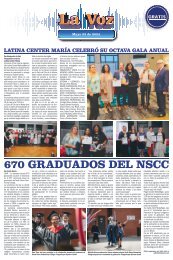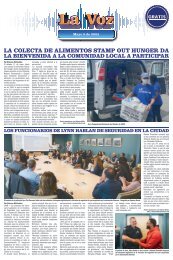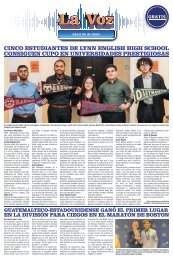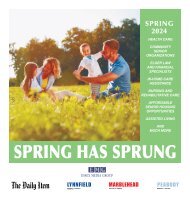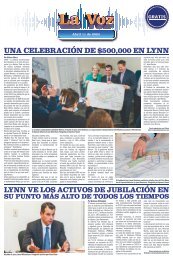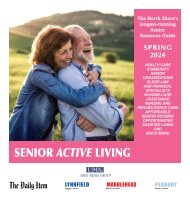Senior Living Spring 2022
Create successful ePaper yourself
Turn your PDF publications into a flip-book with our unique Google optimized e-Paper software.
22 ESSEX MEDIA GROUP SENIOR LIVING SPRING <strong>2022</strong><br />
PHOTO | GETTY IMAGES<br />
Tips to remain independent by preventing falls<br />
STATEPOINT<br />
Few things are more important to<br />
older adults than their independence —<br />
being able to do what they’d like when<br />
they’d like. But independence can be<br />
fleeting. Something unexpected, like a<br />
fall, can change everything. That’s why<br />
it’s important for older adults and their<br />
loved ones to take steps now to reduce<br />
the risk of a fall from happening.<br />
Three million older people are treated<br />
in emergency rooms each year because<br />
of injuries caused by falls, according to<br />
the Centers for Disease Control and<br />
Prevention (CDC). This includes broken<br />
bones and head injuries that can rob individuals<br />
of their freedom. Even having<br />
a fear of falling can restrict individuals<br />
from enjoying their life to the fullest.<br />
Thankfully, many falls can be prevented<br />
with a little forethought and<br />
advance planning, according to Dr. J.B.<br />
Sobel, chief medical officer for Medicare,<br />
with Cigna, one of the nation’s largest<br />
insurers, which serves hundreds of<br />
thousands of older adults through its<br />
Medicare plans. Dr. Sobel recommends<br />
older adults take the following precautions<br />
to prevent falls and increase their<br />
peace of mind.<br />
Get an annual eye exam. More than<br />
12 million Americans aged 40 years and<br />
older experience vision impairment,<br />
putting them at greater risk of falling.<br />
It’s important for them to get an annual<br />
eye exam and make sure that they<br />
wear their glasses as instructed. Many<br />
Medicare Advantage (MA) plans, such<br />
as those offered through Cigna, provide<br />
some vision coverage at no extra cost.<br />
Review medications. People tend to<br />
take more medications as they age.<br />
Some of these medications, or a combination<br />
of medications, can cause dizziness<br />
or confusion, resulting in falls.<br />
<strong>Senior</strong>s should talk to their doctor or<br />
pharmacist about the medicines they<br />
are taking, including over-the-counter<br />
medications, regarding any interactions<br />
or unwanted side effects.<br />
Do strength and balance exercises.<br />
Regular exercise strengthens muscles<br />
and improves balance and flexibility,<br />
helping reduce the chance of falls. Many<br />
MA plans include a fitness benefit at<br />
no extra cost. The benefit may include<br />
kits, bands and videos that can be used<br />
at home to help limit exposure to CO-<br />
VID-19, while achieving the benefits of<br />
exercise. Patients should always talk to<br />
their doctor about what exercises are<br />
right for them.<br />
Limit alcohol consumption. Even a<br />
small amount of alcohol can affect a<br />
person’s balance and reflexes, leading<br />
to a fall. According to the National Institute<br />
on Aging, alcohol is a factor in<br />
60 percent of falls in older Americans.<br />
For those individuals who may need it,<br />
Medicare covers alcohol abuse screening,<br />
counseling and treatment. Please<br />
be sure to discuss these types of issues<br />
with your doctor.<br />
Ensure a safe home. <strong>Senior</strong>s can benefit<br />
from having grab bars installed<br />
inside and outside the bathtub tub or<br />
shower and next to the toilet, as well as<br />
having railings installed on both sides of<br />
stairs. Also, potential tripping hazards,<br />
such as floor mats, area rugs or extension<br />
cords, should be removed or taped<br />
down, both inside and outside the home.<br />
Be careful with face masks. Wearing a<br />
face mask is a reality of the times, even<br />
after a COVID-19 vaccination, but face<br />
masks can restrict peripheral vision.<br />
When wearing a face mask, make sure<br />
it is snug covering both your nose and<br />
mouth, and take slow and measured<br />
steps. Those who wear glasses should<br />
wash the lenses with soap and water (if<br />
permitted by the manufacturer), shake<br />
off the excess liquid and allow them to<br />
air dry. This can help provide a fog barrier.<br />
“Today, many older adults take good<br />
care of themselves and feel younger<br />
than they are,” Sobel said. “They are<br />
rightfully proud and don’t want to make<br />
concessions for their age. But a fall can<br />
happen to the best of us. So, it’s better to<br />
be safe than sorry.”<br />
The information contained in this article<br />
is not intended to be a substitute for<br />
professional medical advice, diagnosis<br />
or treatment. Always seek the advice of<br />
your physician or other qualified health<br />
care provider with any questions you<br />
may have regarding a medical condition<br />
or treatment and before undertaking a<br />
new health care regimen.










